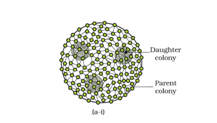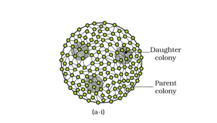Artificial taxonomy is connected with the
(1) use of habit and habitat of organisms
(2) based on the presence or absence of chemicals in cells or tissues
(3) based on morphological traits
(4) based on evolutionary history of a species
कृत्रिम वर्गीकरण किससे सम्बंधित है?
(1) जीवों की प्रवृत्ति और निवास स्थान का उपयोग
(2) कोशिकाओं या ऊतकों में रसायनों की उपस्थिति या अनुपस्थिति के आधार पर
(3) आकृतिक लक्षणों के आधार पर
(4) किसी प्रजाति के विकासवादी इतिहास पर आधारित
Which of the following groups of algae produces algin?
(1) Phaeophyceae and Chlorophyceae
(2) Rhodophyceae and Phaeophyceae
(3) Chlorophyceae and Rhodophyceae
(4) Phaeophyceae only
निम्नलिखित में से शैवालों का कौन सा समूह एल्जिन का उत्पादन करता है?
(1) फियोफाइसी और क्लोरोफाइसी
(2) रोडोफाइसी और फियोफाइसी
(3) क्लोरोफाइसी और रोडोफाइसी
(4) केवल फियोफाइसी
Blue Green algae comes under
(1) Monera
(2) Brown Algae
(3) Eukaryotes
(4) Plantae
नील हरित शैवाल किसके अंतर्गत आता है?
1. मोनेरा
2. भूरे शैवाल
3. सुकेंद्रकी
4. प्लांटी
If we want to know evolutionary relationships between organisms then which classification will resolve it :
(1) Artificial classification
(2) Natural classification
(3) Cytotaxonomy
(4) Phyogenetic classification
यदि हम जीवों के बीच विकासीय संबंधों को जानना चाहते हैं, तो कौन सा वर्गीकरण इसका समाधान करेगा?
1. कृत्रिम वर्गीकरण
2. प्राकृतिक वर्गीकरण
3. कोशिकावर्गिकी
4. जातिवृत्तीय वर्गीकरण
Algae is not
(1) Chlorophyll-bearing
(2) Simple Thalloid
(3) Mainly Fresh water
(4) Largely Aquatic
शैवाल नहीं हैं
1. पर्णहरित धारण करने वाले
2. सरल थैलसाभ वाले
3. मुख्यतः अलवणीय जल वाले
4. मुख्यतः जलीय
Vegetative reproduction occurs by
(1) Fragmentation
(2) By zoospores
(3) Anisogamous
(4) All of these
कायिक प्रजनन किसके द्वारा होता है?
1. विखंडन
2. अलैंगिक चलबीजाणुओं द्वारा
3. असमयुग्मकी
4. ये सभी
The members of chlorophyceae are not
(1) Green algae
(2) Unicellular, colonial or filamentous plant body
(3) Pigments chlorophyll a and b
(4) Pigments are localised in the cytoplasm
क्लोरोफाइसी के सदस्य नहीं होते हैं
1. हरे शैवाल
2. एककोशिकीय, निवही अथवा तंतुमय पादप काय
3. वर्णक पर्णहरित a और b
4. वर्णक कोशिका द्रव्य में सुस्पषट होते हैं।
This picture is associated with an organism that belongs to a class. Which of the following features is not correct about that class?

(1) Three types of sexual reproduction
(2) A variety of chloroplast in different species
(3) Inner pectose and outer cellulose in cell wall
(4) Pigments-choorophyll a and chlorophyll b
यह चित्र एक जीव से संलग्न है जो एक वर्ग से संबंधित है। निम्नलिखित में से कौन सी विशेषता उस वर्ग के विषय में सही नहीं है?

*Parent colony- जनक कॉलोनी
*Daughter colony- सम्पति कॉलोनी
1. तीन प्रकार के लैंगिक प्रजनन
2. विभिन्न प्रजातियों में विभिन्न प्रकार के हरितलवक
3. कोशिका भित्ति में आंतरिक पेक्टोस और बाहरी सेलुलोस
4. वर्णक-पर्णहरित a और पर्णहरित b
Which of the following is an example of isogamous reproduction?
(1) Ulothrix
(2) Eudorina
(3) Volvox
(4) Fucus
निम्न में से कौन सा असमयुग्मकी प्रजनन का एक उदाहरण है?
1. यूलोथ्रिक्स
2. यूडोराइना
3. वॉल्वॉक्स
4. फ्यूकस
The world's tallest (angiosperm) flowering tree is
(1) Sequoia
(2) Eucalyptus
(3) Pinus
(4) Cedrus
विश्व का सबसे ऊँचा (आवृतबीजी) पुष्पीय वृक्ष है
(1) सिकुआ
(2) यूकेलिप्टस
(3) पाइनस
(4) सिड्रस






